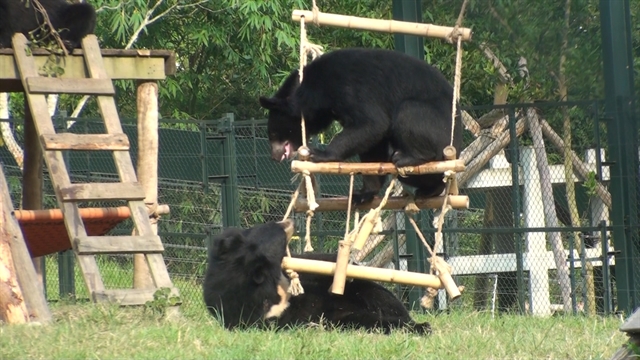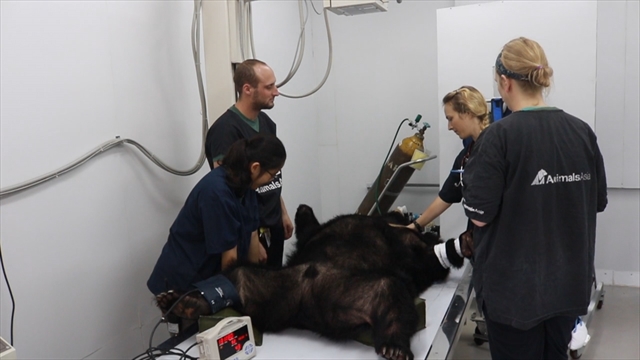The recent hand over of four bears from Hanoi’s Central Circus to a sanctuary is a big step towards helping bears in Việt Nam, said a representative of animal welfare organisation Animals Asia.

Two of the rescued bears play at the Vietnam Bear Rescue Centre. — Photos courtesy of Animals Asia
On June 15, four Asiatic black bears, aged between five and seven years old, which were tamed to perform on stage at the circus, were transferred to the Vietnam Bear Rescue Centre in Tam Đảo District, northern Vĩnh Phúc Province.
This marked the end of wild bear performances at the circus, a result of many years of campaigning by the animal welfare organisation.
“This is very important,” Tuan Bendixsen, Vietnam Director of Animals Asia which operates the sanctuary, told Việt Nam News.
“The Central Circus is a premier circus in Việt Nam and run by the central government. And if they are putting out signals that we will not be using wild animals anymore, then hopefully the rest of the circuses in the country will follow suit.”
People’s artist Tống Toàn Thắng, deputy director of the Hanoi Central Circus said it was a hard but inevitable decision to make.
Thắng said: “Spectators may ask why there are no longer bears performances, they may ask is it because the circus art has so lagged behind that no artists can now perform with dangerous animals?
“I hope they will understand that amid development and international integrity we have to abide with international regulations and conventions.”
Animals Asia has been campaigning for an end of wild animals and other animals in circuses in Việt Nam since 2017, once considered a challenging task given the pretty low awareness on animal rights in the country.
But things are changing gradually, according to Bendixsen.
He said: “A lot of schools now are not allowing the students to go to the circuses to see the wild animals performing.
“The Government has also started doing their bit as well. Recently they introduced Decree 14, which is the first decree ever to spell out punishment for anyone who abuses animals.
“So we feel that with the help from the public and changes of public attitude, we will start seeing a very bright future for the wildlife in Việt Nam.”

A bear undergoes a health check-up at the rescue centre.
The four bears, named Ginger, Chili, Pepper, and Saffron, were reunited with their old friends, Sugar and Spice, which were transferred to the same sanctuary two years ago, also from the same circus.
At the sanctuary, the bears are treated to lush habitats, fresh food tailored to their diets, soothing pools, and life-long health care.
“At the rescue centre they can do what they want,” Bendixsen added.
“They are getting good food, and we will make sure that they are growing up properly.
“We hope that, because the bears are quite young, after spending a period of time at the Animals Asia Rescue Centre we can start looking at whether they are suitable to be released into the wild or not.”
For the past several years, 15 circuses across Việt Nam, including Hanoi Central Circus have committed to ending wild animal performances.
But more still needs to be done, according to Bendixsen.
He added: “Despite the Central Circus giving up the last four bears, there are still smaller circuses in the country that are still using wild animals, mostly cats or monkeys. So we still continue our campaign to encourage the circus to stop using wild animals.
“Besides that we are also working to help government centres. Because once the circuses stop using wild animals there must be a place for them to go to. So we need to have a proper rescue centre to look after these animals.”
Việt Nam is home to two species of bears: the Asiatic black bear and the Malayan sun bear. Both species are protected under Việt Nam’s wildlife protection law which stipulates that is illegal to hunt, trap, possess, kill, sell or advertise bears or bear products in the country.
However, many bears are still hunted in the wild and sold live to commercial farms, where they are exploited for their bile to meet consumer demand. Deforestation, expansion of agriculture and modernisation have also resulted in the loss of the bears’ natural habitat.
Thu Hà – Bảo Hoa